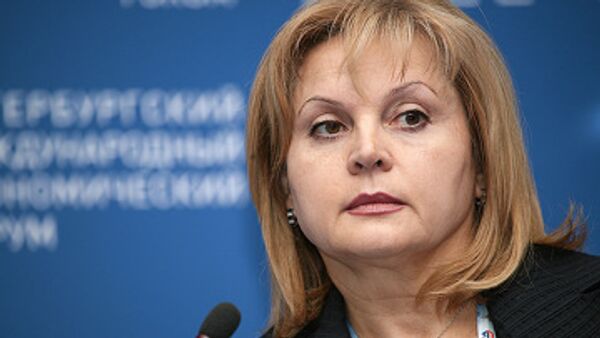An agreement on cooperation in the monitoring of corruption in Russia and the U.S. was reached between Russian negotiators and Transparency International during the first session of the Russian-U.S. working group on civil society, held in Washington on Wednesday.
The working group, jointly headed by Kremlin deputy chief of staff Vladislav Surkov and Obama's top adviser on Russia Michael McFaul, was created as part of a Russian-U.S. presidential commission established in summer 2009, during U.S. President Barack Obama's visit to the Russian capital, Moscow.
"For me, the main thing was a real practical... [result]. The proposal, which was supported by everybody. An agreement to jointly monitor corruption in Russia and in the U.S. and to develop universal corruption evaluation criteria based on the Russian and U.S. experience was reached with such a respected international organization as Transparency International, with its representative in the United States and in Russia," said Ella Pamfilova, who heads Russia's presidential Civil Society Institution and Human Rights Council.
"This is extremely important in as far as American businesses operate in Russia and our businesses in the U.S.," she added.
Pamfilova said joint experience and involving non-government organizations in the monitoring process may yield significant results.
"This joint experience is extremely important. This is not a one way street. Since all the problems, which our commission will discuss, such as immigration, child abuse, and others, are related to corruption, the joint experience and the involvement of Russian and U.S. non-government organizations and representatives of government bodies may yield a very interesting result," she said.
A source in the Russian delegation said that one of the Transparency International top representatives, who took part in the Washington talks, told Russian negotiators about corruption in the U.S.
"He acknowledged that the methodology for working out the index [which measures corruption in various countries] did not stipulate the participation of experts and non-government organizations from our [Russian] side, while Russia appears in this rating now in 185th place, then in 163th. Usually, it depends on relations - if they worsen, they put the corruption [level] higher, if they improve - [they] drop [the level]," the source said.
The Russian delegation spokesman said the Transparency International official agreed that cooperation with Russian organizations can be productive.
"They proposed that they disclose the methodology, and our non-government organizations, sociologists, will be involved in working out the [new] methodology, in order to clarify why it is important - because corruption criteria exist - and how they would be estimated," the spokesman said.
He said "besides this, for about half an hour, the Transparency International representative told us very interesting facts relating to corruption in the U.S.," adding "it was quite unusual for us."
The spokesman said the methodology for estimating corruption levels in various countries with the involvement of non-government organizations is to be worked out within six months.
Participants in the talks also focused on the protection of children's rights and on measures to fight the spread of child pornography.
"We will focus on the monitoring of pornography traffic. We cooperate at a very high level. The work is very productive," the spokesman said.
He said a new meeting of the Russian-U.S. presidential commission would take place in Moscow, but the date had not yet been fixed.
"Next time we will discuss immigration and the conditions in which prisoners are held," he said.
Pavel Astakhov, President Dmitry Medvedev's ombudsman on children's rights, who also took part in the discussions, said the status of Russian children adopted by U.S. parents was not discussed during the meeting.
Astakhov said both Russia and America should step up their efforts in the sphere of children's rights.
"The number of crimes against children is high in Russia and the U.S., and the largest amount of damaging pornographic information is being spread on the Internet in the U.S. We [Russia] are second," he said, adding "concrete proposals" to fight the spread of child pornography were put forward by participants in the talks.
Fighting stereotypes was another major issue of the Russian-U.S. discussions. The Russian side delivered a report on where the stereotypes originate from.
"Both we and our U.S. colleagues acknowledged that such negative stereotypes of the U.S have been existing in Russia for a long time, as well as that stereotypes of Russia exist in the U.S. They have a negative impact on our citizens' relationships, and on inter-state relations," Russia's human rights ombudsman Vladimir Lukin, another participant in the talks, said.
He said the report delivered by the Russian delegation showed Russians' attitudes to Americans were positive, while their attitudes to U.S. policies were negative.
The source in the Russian delegation said the U.S. negotiators expressed their readiness to take steps to improve the situation.
WASHINGTON, January 29 (RIA Novosti)




